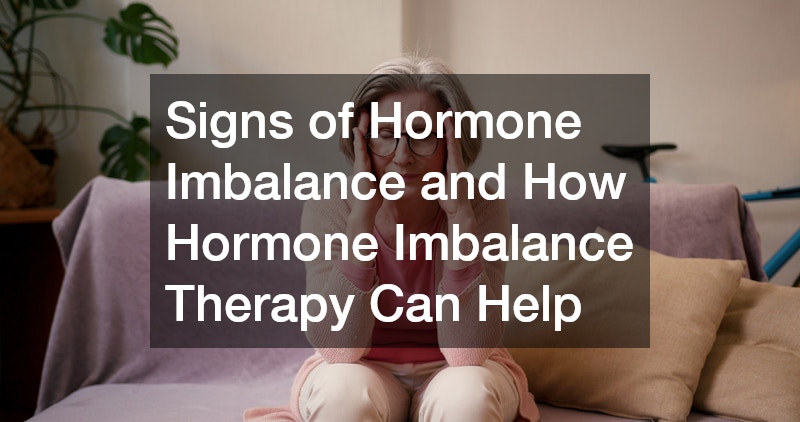Hormonal balance is crucial for maintaining overall health and well-being. The body’s endocrine system produces hormones that regulate various functions, including metabolism, mood, and reproductive processes. When this balance is disrupted, it can lead to numerous health issues, making hormone imbalance therapy an essential consideration for restoring equilibrium.
An imbalance can impact one’s physical, emotional, and cognitive health, leading to a variety of symptoms that can affect daily life. Understanding how these imbalances occur is the first step toward effective treatment and management.
Therapy for hormone imbalances often includes lifestyle modifications, medical interventions, and alternative therapies.
Hormone imbalance therapy aims to address the root causes and manage the symptoms, helping individuals lead healthier lives. Treatments are tailored to individual needs, emphasizing the importance of recognizing symptoms early and seeking professional advice. With advances in medical science, effective strategies for treating hormone imbalances continue to evolve, offering hope to those affected.
What are the Common Symptoms of Hormone Imbalance?
Physical Symptoms
Physical symptoms of hormone imbalance can manifest in different ways, impacting lifestyle and health. One common symptom is unexplained weight gain, which can be frustrating for individuals trying to maintain a healthy weight. Fatigue is another prevalent symptom, leaving individuals with persistent tiredness despite having adequate rest.
Besides, hormonal imbalances can lead to skin changes, such as acne outbreaks or changes in skin texture. These symptoms can affect self-esteem and confidence, prompting individuals to seek solutions. Recognizing these physical signs can serve as an initial step toward understanding and addressing hormone imbalances.
The body’s hormonal system is interlinked with other bodily processes, meaning an imbalance can trigger or exacerbate other health issues. For instance, metabolic issues or chronic conditions might arise or worsen due to hormone disruptions. Achieving a balanced hormonal environment is thus critical to maintaining physical health and preventing further complications.
Emotional Symptoms
Emotionally, hormone imbalances can significantly affect mood and mental health. Mood swings are a common emotional symptom, often leaving individuals feeling emotionally unstable. These swings can range from irritability to sadness, sometimes making it difficult for individuals to manage daily activities effectively.
Anxiety and depression are also linked to hormonal changes, often exacerbating existing mental health conditions. Individuals may experience heightened anxiety levels, or feelings of hopelessness and depression without an obvious cause. Understanding the hormonal roots of these emotional symptoms is crucial for developing effective treatment strategies.
Unbalanced hormone levels can lead to significant upheaval in one’s emotional well-being. The emotional symptoms can strain personal and professional relationships, emphasizing the need for effective management and therapy. By addressing these symptoms through targeted therapies, individuals can work towards a more stable emotional state.
Cognitive Effects
Cognitive effects of hormone imbalances can lead to challenges that affect daily functioning. Impaired memory is a significant cognitive issue, causing difficulties in remembering recent events or details. This can lead to frustration and concern, especially for individuals who previously had strong cognitive abilities.
Concentration issues often accompany cognitive effects, making it challenging for individuals to focus on tasks or retain information. This cognitive cloudiness, sometimes described as “brain fog,” can be particularly problematic in work or academic settings. Addressing these cognitive symptoms often requires a multifaceted approach involving therapy and lifestyle modifications.
Additionally, cognitive symptoms can be subtle and progress gradually, making them harder to detect at first. However, early identification and intervention can minimize the impact on cognitive health. Hormone imbalance therapy offers strategies to help improve cognitive clarity and reduce mental cloudiness.
How is Hormone Imbalance Diagnosed?
Clinical Evaluations
Diagnosing hormone imbalances typically begins with a thorough clinical evaluation by healthcare providers. These assessments involve reviewing the patient’s medical history, as patterns and previous health conditions can provide essential clues. Alongside patient history, physical examinations are crucial for identifying any visible signs of hormonal imbalance.
During a clinical evaluation, a comprehensive conversation about symptoms and lifestyle can help personalize the diagnostic process. Physicians use this information to guide further diagnostic testing and develop a tailored treatment plan. Clinical evaluations are a critical first step in the accurate diagnosis and eventual treatment of hormone imbalances.
Healthcare providers also take into account familial health history, as genetics can influence hormonal health. This holistic approach ensures that all potential underlying causes of hormone imbalances are considered. By integrating clinical evaluations with patient-specific data, healthcare providers can develop more effective diagnostic strategies.
Laboratory Tests
Laboratory tests play a significant role in diagnosing hormone imbalances by providing concrete data. Blood tests are commonly used to measure hormone levels directly, offering insights into the body’s hormonal environment. In addition to blood tests, saliva tests can be employed to evaluate hormone fluctuations throughout the day.
Urine tests are another diagnostic tool, particularly for measuring hormone metabolites and understanding hormone production over time. These tests collectively provide a comprehensive picture of a person’s hormonal health. Accurate lab tests are essential for developing effective treatment plans geared toward individual hormonal needs.
Results from these tests help healthcare providers understand the severity and specific areas of hormone imbalance. This precise data allows for more targeted treatment strategies, increasing the likelihood of effective symptom management. Regular monitoring through laboratory tests is also crucial for assessing the effectiveness of treatment interventions.
What are the Treatment Options for Hormone Imbalance?
Lifestyle Modifications
Lifestyle modifications are foundational to managing hormone imbalances effectively. A balanced diet rich in nutrients can support endocrine health and stabilize hormone production. Regular physical activity, including cardiovascular and strength exercises, can reduce stress and improve overall well-being.
Stress management is another crucial aspect of lifestyle modification, as chronic stress can exacerbate hormone imbalances. Techniques such as meditation, yoga, and deep breathing exercises can help manage stress levels. By addressing lifestyle factors, individuals can significantly improve their hormonal health and reduce the impact of imbalances.
Sleep is also a critical component, as adequate rest supports the body’s natural hormone regulation processes. Establishing a regular sleep schedule and creating a restful environment can improve sleep quality. These lifestyle adjustments, when combined, offer a holistic approach to managing hormone imbalances.
Hormone Replacement Therapy
Hormone Replacement Therapy (HRT) is a widely used treatment option for addressing hormone imbalances. HRT aims to supplement the body with hormones that are deficient or out of balance, providing relief from symptoms. This therapy can be tailored to individual needs, ensuring that hormone levels are optimized for each patient.
Various forms of HRT are available, including oral pills, patches, gels, and injections. Each method has its benefits, and the choice often depends on the specific hormone imbalance and patient preferences. When properly administered, HRT can significantly improve quality of life by alleviating symptoms associated with hormone imbalances.
It is crucial to monitor hormone levels regularly during HRT to ensure effectiveness and minimize potential side effects. Regular consultations with healthcare providers are necessary to adjust treatment as needed. This personalized approach helps achieve and maintain hormonal balance over the long term.
Alternative Therapies
Alongside conventional treatments, alternative therapies can provide additional support for managing hormone imbalances. Herbal supplements, such as black cohosh and evening primrose oil, are often used to alleviate specific symptoms. These natural remedies can offer complementary benefits when integrated with other treatment strategies.
Acupuncture is another alternative therapy that has gained attention for its potential role in hormone regulation. It is believed to stimulate the body’s energy flow, which may influence hormone production and balance. By reducing stress and promoting relaxation, acupuncture may contribute to improved hormonal health.
While alternative therapies should not replace conventional treatments, they can enhance overall therapy by offering additional symptom relief. Consulting with healthcare providers before starting any alternative therapy is essential to ensure safety and compatibility with existing treatments. A combined approach can provide comprehensive care for individuals experiencing hormone imbalances.
Recognizing the signs of hormone imbalance is essential for obtaining accurate diagnoses and exploring effective treatment options. With a variety of symptoms that impact physical, emotional, and cognitive health, early intervention is critical for preventing further complications. Hormone imbalance therapy, including lifestyle modifications, HRT, and alternative therapies, offers a path to restoring balance and improving quality of life.
Consulting with healthcare providers, undergoing comprehensive evaluations, and considering the full range of treatment strategies empower individuals to manage their hormonal health effectively. Achieving hormonal balance involves a personalized approach, addressing specific symptoms and underlying causes. By taking proactive steps, individuals can work towards greater health and well-being.
As medical advancements continue, new strategies and treatments for hormone imbalances become available, offering renewed hope to those affected. Staying informed and engaged with healthcare resources ensures that individuals can access the best possible care. Through dedicated efforts, hormone imbalance therapy remains a vital component in promoting health and vitality.




